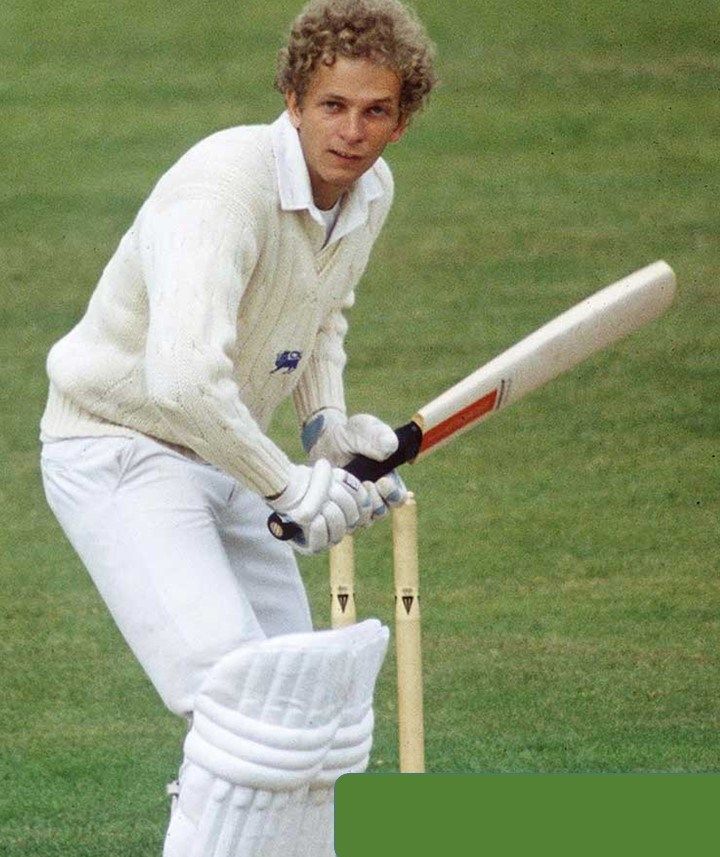Archetyping patrician English grace, David Gower nonchalantly carved 11 Test centuries en route to 8,231 runs against colourful 1970s and 80s attacks.
Though captaincy fortunes wavered, immaculate wrist-driven strokeplay enchanted fans experiencing his 158 ODIs overseas and at home.
Gower glided deliveries effortlessly behind point during era-shaping Ashes victories under Brearley that included an enthralling 215 at Adelaide; though Botham’s 1981 fireworks ironically contributed to tumult for this cautious skipper.
Controversy lingered too over banned South African tours – but while Gower wrestled impatient selectors, demure charm kept public affection.
Article Highlights
Hide- David Gower was born on April 1, 1957, in Tunbridge Wells, Kent, England, and came from a family with a military background.
- He attended The King's School in Canterbury, where he developed his fluid and commanding batting style and had early exposure to cricket.
- Gower made his debut for Leicestershire County Cricket Club in 1975 and quickly established himself as a player of exceptional promise, with a left-handed batting style known for its elegance and fluid strokes.
- Gower eventually became the captain of the English cricket team, leading them in 32 Test matches and adopting an attacking brand of cricket, although his leadership style had mixed success.
When the aristocratic persona occasionally attracted scorn for overly casual strokeplay, luminous talent rescued Gower from prolonged exile.
Ultimately sophistication both on screen later as a broadcaster and facing Marshall or Lillee summarized the touchpaper genius lighting up English cricket during four decades.
Early Life and Background
David Gower, born on April 1, 1957, in Tunbridge Wells, Kent, England, emerged from a family with a strong military background, which imbued in him a sense of discipline and poise that later translated into his elegant approach to the game of cricket.
This disciplined upbringing, juxtaposed with the freedom cricket offered, allowed Gower to develop a batting style that was both fluid and commanding, a reflection of the duality of his early environment.
Gower attended The King’s School in Canterbury, where the structured academic atmosphere was counterbalanced by the sporting opportunities that honed his natural talent.
Graham Gooch
Batting behemoth Graham Gooch perfectly embodied Essex grittiness and relentless run accumulation ... Read More
His early exposure to cricket was pivotal; it was within the historic confines of the school’s cricket grounds that Gower’s affinity for the sport transitioned from nascent interest to a burgeoning passion.
The technical nuances of cricket, coupled with the sport’s demand for mental fortitude, aligned well with the rigorous tenets of his family’s military ethos.
It was in this crucible that Gower’s potential was tempered, setting the stage for his later ascendancy in the international cricket arena.
His formative years, therefore, not only shaped his character but also crafted the foundations of what would become a storied career.
David Gower: Rise Through the Ranks
As Gower progressed into his late teens, his cricketing prowess became increasingly evident, culminating in his debut for Leicestershire County Cricket Club in 1975, where he quickly established himself as a player of exceptional promise.
Gower’s ascent through the ranks was characterized by a blend of natural talent and a cultivated technique that allowed him to navigate the nuances of the game with grace and efficiency.
Analyzing his formative years with Leicestershire, one notes a swift adaptation to the demands of first-class cricket. Gower’s elegant left-handed batting style, marked by fluid strokes and a poised demeanor at the crease, resonated with connoisseurs of the sport.
His penchant for timing rather than brute force set him apart from his contemporaries, endowing him with the capacity to compile runs with seemingly effortless ease.
Statistically, Gower’s progression was underscored by a rapid accumulation of runs, punctuated by innings that underscored his potential for international cricket.
It was not merely the volume of his run-scoring but the manner in which he accumulated those runs that signified his readiness for the next level.
This period of robust performances laid the groundwork for Gower’s eventual elevation to the international arena, marking the beginning of a storied cricketing journey.
Captaincy and Leadership
Building upon his exceptional form at the domestic level, Gower’s aptitude for leadership came to the fore as he assumed the captaincy of the English cricket team, ushering in a new chapter of strategic nuances and challenges.
His tenure at the helm was not without controversy; however, Gower’s captaincy must be dissected with an appreciation for his sophisticated approach to the game.
Analyzing his strategic decisions requires an understanding of the cricketing landscape during the early to mid-1980s. Gower’s predilection for an attacking brand of cricket was both lauded and criticized, given the variable successes it yielded.
His leadership style was often perceived as relaxed, potentially underpinning his 32.57 win percentage across his captaincy in Test matches.
Statistically, Gower captained England in 32 Test matches, winning 5, losing 18, and drawing 9. These figures, though not stellar, are somewhat mitigated by the context of the era, including the opposition’s strength and the resources at his disposal. Moreover, his One Day International (ODI) captaincy record is notably more favorable, with 14 wins out of 25 matches.
Gower’s legacy as a captain is thus a complex tapestry, woven with threads of innovation and an undeniably genteel demeanor that both charmed and confounded cricketing aficionados.
David Gower: Career Milestones
Throughout his illustrious career, Gower achieved numerous milestones that not only underscored his talent but also marked significant moments in the annals of cricket history.
His journey was replete with achievements that exemplified his prowess and contributed to his legacy as one of cricket’s most elegant left-handed batsmen.
- Debut Century: Gower made an immediate impact in the international arena by scoring a century in his debut Test match against Pakistan in 1978, showcasing his precocious talent and setting the tone for a distinguished career.
- Ashes Triumphs: He was an integral part of the England team that secured the Ashes series victories in 1985 and 1986/87. His performance in these series was a blend of technical finesse and grace under pressure, cementing his reputation as a player for the big occasion.
- Prolific Scorer: Accumulating over 8,000 runs in Test cricket, Gower’s name became synonymous with prolific scoring, including 18 centuries and 39 fifties, reflecting a career characterized by consistency and flair.
- Captaincy Records: As captain, he led England to a memorable victory in the 1985 Ashes series and ended his captaincy with a commendable win-loss record, illustrating his capability to inspire and guide his team to success on the highest stage.
Post-Retirement Endeavors
Following his retirement from professional cricket, David Gower transitioned seamlessly into a successful career in broadcasting, where his insightful commentary and charismatic presence continued to endear him to fans of the sport.
Gower, with his eloquent delivery and shrewd understanding of the game, quickly became a fixture in the commentary box for numerous international broadcasts.
His post-retirement endeavors extended beyond the microphone; he authored several books, enriching cricket literature with reflections on his personal experiences and the evolution of the game.
His analytical acumen was not confined to the verbal sphere. Gower took on various roles within cricket administration, contributing strategic insights shaped by his extensive experience at the highest levels of competition.
His articulate and informed perspectives on cricket governance issues showcased his commitment to the sport’s integrity and future.
Moreover, Gower’s gravitas in the cricket community saw him participating in philanthropic efforts, harnessing his reputation to support charitable causes.
His engagement in these endeavors has been marked by a genuine passion for social betterment, reflecting the ethos he carried as a player.
Final Take
In conclusion, David Gower’s cricketing journey is marked by a graceful batting style, commendable leadership, and significant contributions to English cricket.
His career, adorned with numerous milestones, reflects both talent and determination.
Gower’s post-retirement endeavors have ensured his lasting presence in the cricketing world, as he continues to influence the sport through various roles.
His legacy remains a testament to the elegance and skill that can be brought to the game of cricket.

















